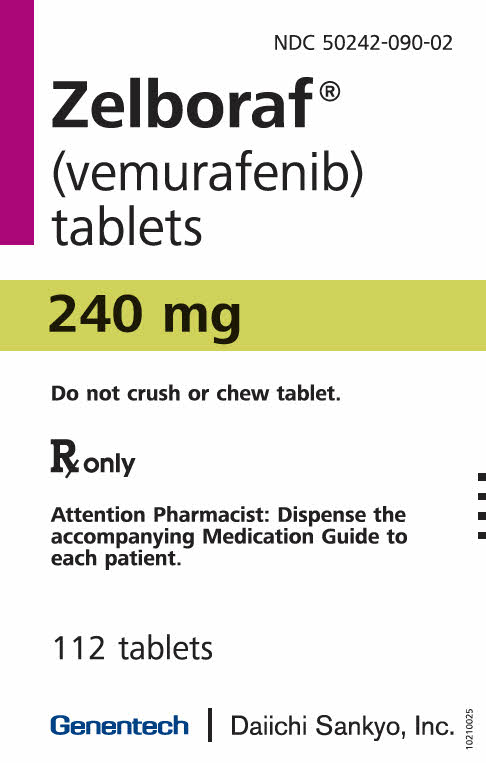Zelboraf
Generic name: vemurafenib
Drug class: Multikinase inhibitors
Medically reviewed by A Ras MD.
What is Zelboraf?
Zelboraf is a prescription medicine that is used to treat a type of skin cancer (melanoma). It is used to treat a type of blood cell cancer called Erdheim-Chester disease (ECD). Zelboraf may be given to you for other reasons.
Description
ZELBORAF (vemurafenib) is a kinase inhibitor available as 240 mg tablets for oral use. Vemurafenib has the chemical name propane-1-sulfonic acid {3-[5-(4-chlorophenyl)-1H-pyrrolo[2,3-b]pyridine-3-carbonyl]- 2,4-difluoro-phenyl}-amide. It has the molecular formula C23H18ClF2N3O3S and a molecular weight of 489.9. Vemurafenib has the following chemical structure:

Vemurafenib is a white to off-white crystalline solid. It is practically insoluble in aqueous media.
Tablets of ZELBORAF are for oral administration. Each tablet contains 240 mg of vemurafenib.
The inactive ingredients of ZELBORAF are: Tablet core: hypromellose acetate succinate, croscarmellose sodium, colloidal silicon dioxide, magnesium stearate, and hydroxypropyl cellulose. Coating: pinkish white: poly (vinyl alcohol), titanium dioxide, polyethylene glycol 3350, talc, and iron oxide red.
Mechanism of Action
Vemurafenib is a low molecular weight, orally available inhibitor of some mutated forms of BRAF serine- threonine kinase, including BRAF V600E. Vemurafenib also inhibits other kinases in vitro such as CRAF, ARAF, wild-type BRAF, SRMS, ACK1, MAP4K5, and FGR at similar concentrations. Some mutations in the BRAF gene including V600E result in constitutively activated BRAF proteins, which can cause cell proliferation in the absence of growth factors that would normally be required for proliferation. Vemurafenib has anti-tumor effects in cellular and animal models of melanomas with mutated BRAF V600E.
Before taking Zelboraf, tell your doctor:
- If you are allergic to Zelboraf; any part of this medicine; or any other drugs, foods, or substances. Tell your doctor about the allergy and what signs you had.
- If you have any of these health problems: Low calcium levels, low magnesium levels, or low potassium levels.
- If you have a long QT on ECG.
- If you are taking any drugs that can cause a certain type of heartbeat that is not normal (prolonged QT interval). There are many drugs that can do this. Ask your doctor or pharmacist if you are not sure.
- If you take any other drugs (prescription or OTC, natural products, vitamins). There are many drugs that interact with Zelboraf, like certain drugs that are used for HIV, infections, or seizures.
- If you are breast-feeding. Do not breast-feed while you take Zelboraf and for 2 weeks after your last dose.
This is not a list of all drugs or health problems that interact with this medicine.
Tell your doctor and pharmacist about all of your drugs (prescription or OTC, natural products, vitamins) and health problems. You must check to make sure that it is safe for you to take Zelboraf with all of your drugs and health problems. Do not start, stop, or change the dose of any drug without checking with your doctor.
What are some things I need to know or do while I take Zelboraf?
- Tell all of your health care providers that you take Zelboraf. This includes your doctors, nurses, pharmacists, and dentists.
- Have blood work checked as you have been told by the doctor. Talk with the doctor.
- This medicine may add to the chance of getting some types of cancer. Talk with the doctor.
- You will need to have a skin exam before you start Zelboraf and every 2 months while you take it. You will also need to do monthly skin checks as told by your doctor.
- You may get sunburned more easily. Avoid sun, sunlamps, and tanning beds. Use sunscreen and wear clothing and eyewear that protects you from the sun.
- Bright lights may bother you. Wear sunglasses.
- This medicine may cause a type of abnormal heartbeat (prolonged QT interval). If this happens, the chance of other unsafe and sometimes deadly abnormal heartbeats may be raised.
- You will need an ECG before starting Zelboraf and during treatment. Talk with your doctor.
- If you have had or will be having radiation treatment, talk with your doctor. Worse side effects from radiation treatment have happened with Zelboraf. Sometimes this has been deadly.
- A severe and sometimes deadly reaction has happened. Most of the time, this reaction has signs like fever, rash, or swollen glands with problems in body organs like the liver, kidney, blood, heart, muscles and joints, or lungs. If you have questions, talk with the doctor.
- Bending of the fingers inward has happened with Zelboraf. Sometimes, this could be very bad or disabling. Call your doctor right away if this happens to you.
- If you are 65 or older, use Zelboraf with care. You could have more side effects.
- This medicine may cause harm to the unborn baby if you take it while you are pregnant.
- Use birth control that you can trust to prevent pregnancy while taking Zelboraf and for at least 2 weeks after stopping the drug.
- If you get pregnant while taking Zelboraf or within 2 weeks after your last dose, call your doctor right away.
How is Zelboraf best taken?
Use Zelboraf as ordered by your doctor. Read all information given to you. Follow all instructions closely.
- Take with or without food.
- Swallow whole. Do not chew or crush.
- Take with a full glass of water.
- If you throw up after taking a dose, do not repeat the dose. Take your next dose at your normal time.
- Keep taking Zelboraf as you have been told by your doctor or other health care provider, even if you feel well.
What do I do if I miss a dose?
- Take a missed dose as soon as you think about it.
- If the next dose is less than 4 hours away, skip the missed dose and go back to your normal time.
- Do not take 2 doses at the same time or extra doses.
What are the side effects of Zelboraf that I need to call my doctor about immediately?
WARNING/CAUTION: Even though it may be rare, some people may have very bad and sometimes deadly side effects when taking a drug. Tell your doctor or get medical help right away if you have any of the following signs or symptoms that may be related to a very bad side effect:
- Signs of an allergic reaction, like rash; hives; itching; red, swollen, blistered, or peeling skin with or without fever; wheezing; tightness in the chest or throat; trouble breathing, swallowing, or talking; unusual hoarseness; or swelling of the mouth, face, lips, tongue, or throat.
- Signs of liver problems like dark urine, feeling tired, not hungry, upset stomach or stomach pain, light-colored stools, throwing up, or yellow skin or eyes.
- Signs of kidney problems like unable to pass urine, change in how much urine is passed, blood in the urine, or a big weight gain.
- Dizziness or passing out.
- A fast heartbeat.
- A heartbeat that does not feel normal.
- Swelling in the arms or legs.
- A skin lump or growth.
- Redness, irritation, pain, or thick skin on the palms of the hands or soles of the feet.
- Change in eyesight, eye pain, or very bad eye irritation.
- A burning, numbness, or tingling feeling that is not normal.
- Very bad headache.
- Have your skin checked. Tell your doctor if you have any skin changes like a new wart, skin sore or reddish bump that bleeds or does not heal, or a change in the color or size of a mole.
- A very bad skin reaction (Stevens-Johnson syndrome/toxic epidermal necrolysis) may happen. It can cause very bad health problems that may not go away, and sometimes death. Get medical help right away if you have signs like red, swollen, blistered, or peeling skin (with or without fever); red or irritated eyes; or sores in your mouth, throat, nose, or eyes.
What are some other side effects of Zelboraf?
All drugs may cause side effects. However, many people have no side effects or only have minor side effects. Call your doctor or get medical help if any of these side effects or any other side effects bother you or do not go away:
- Hair loss.
- Muscle or joint pain.
- Back pain.
- Itching.
- Headache.
- Upset stomach or throwing up.
- Diarrhea.
- Constipation.
- Change in taste.
- Feeling tired or weak.
- Not hungry.
- Cough.
- Dry skin.
These are not all of the side effects that may occur. If you have questions about side effects, call your doctor. Call your doctor for medical advice about side effects.
You may report side effects to the FDA at 1-800-332-1088. You may also report side effects at https://www.fda.gov/medwatch.
If overdose is suspected:
If you think there has been an overdose, call your poison control center or get medical care right away. Be ready to tell or show what was taken, how much, and when it happened.
How do I store and/or throw out Zelboraf?
- Store in the original container at room temperature.
- Keep lid tightly closed.
- Store in a dry place. Do not store in a bathroom.
- Keep all drugs in a safe place. Keep all drugs out of the reach of children and pets.
- Throw away unused or expired drugs. Do not flush down a toilet or pour down a drain unless you are told to do so. Check with your pharmacist if you have questions about the best way to throw out drugs. There may be drug take-back programs in your area.
Label
PRINCIPAL DISPLAY PANEL – 240 MG TABLET BOTTLE CARTON
- NDC 50242-090-02
- Zelboraf®
(vemurafenib)
tablets - 240 mg
- Do not crush or chew tablet.
- Rx only
- Attention Pharmacist: Dispense the
accompanying Medication Guide to
each patient. - 112 tablets
- Genentech | Daiichi Sankyo, Inc.
- 10210025

SRC: NLM .
